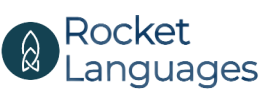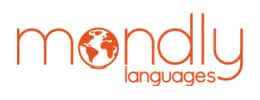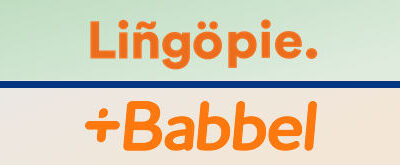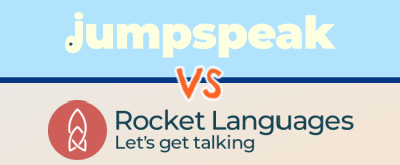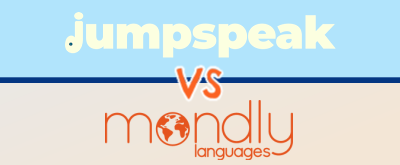Although Mondly and Rocket Languages are similar in several respects, they also differ in quite a few ways. In this article, we explore those differences so you can determine which program is the better choice to help you learn a new language.
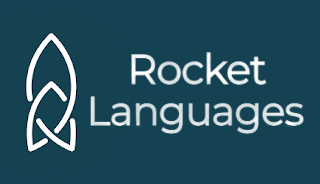
Sale: 60% OFF
Use Code: INSIGHT60
|
$180 lifetime |
Our highest-rated app to learn a new language. With audio lessons, detailed grammar instruction, and diverse exercises, Rocket Languages has it all. |
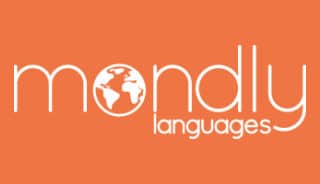
Sale: 50% OFF
Applied In Cart
|
$4-$10/mo |
A great app for beginners and vocab acquisition. With a cool, modern interface and fast-moving lessons, it is quite different from Rocket. |
Video: Which Language App Is Best?
In the video above, Bianca from the Guide2Fluency team compares the courses from Rocket Languages and Mondly.
Editor’s Choice
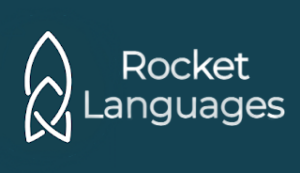
Rocket Languages
- Free Trial
- Money Back Guarantee
Pros
- Rocket’s curriculum and learning framework is much more comprehensive
- Quick and accurate speech recognition technology (powered by Google)
- Rocket Languages offers frequent, large discounts
- Interactive audio lessons with fluent speakers to develop listening and speaking skills first
- Detailed grammar instruction and cultural insights
Cons
- More expensive than Mondly
- Lesson format is not as “fun” as Mondly’s format
How Each Language Program Works
When comparing language learning apps, before diving straight into which program I think is better, I like to provide a quick overview of how each program works. I think this helps to set the stage for my coming points about pros and cons. Let’s begin with Mondly.
Mondly
The driving force of the Mondly program is their daily lessons. Every day when you log in, you’re given a daily lesson to complete. Just a simple and straightforward lesson assignment.
Then, when you complete it, it will be marked as finished on the dashboard, and a little countdown clock will start to indicate when the next day’s daily lesson is ready (at midnight).
The daily lesson takes just five minutes or so to complete and is built on a sequence of interactive, fast-moving exercises. This includes flashcard-type drills, fill-in-the-blanks, speaking drills, translation exercises, matching pairs, back-and-forth conversations, spelling drills, and a few more.
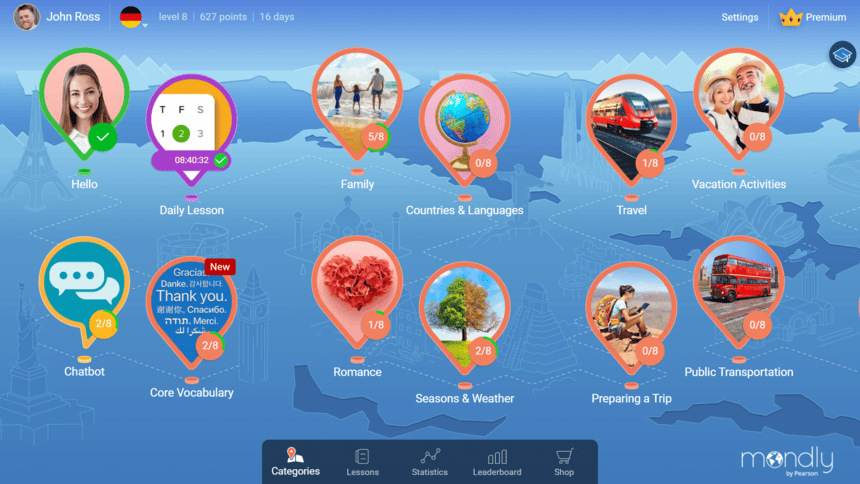
When you finish your daily lesson, Mondly gives you a quick recap of the vocab from that session by presenting the phrases one last time, and then takes you to a screen with your performance data.
After that daily lesson and recap is complete, you’re somewhat on your own to continue working through supplemental lessons on the dashboard.
As for those lessons, it needs a bit of explanation. The Mondly dashboard looks like a giant map covered in geolocation pins. At first glance it looks kind of like a learning path to follow, but it’s much less structured than that.
Essentially, each geolocation pin is a collection of eight lessons that covers a specific topic or theme, such as sports or weather. You are free to jump from pin to pin however you want to learn about these different topics.
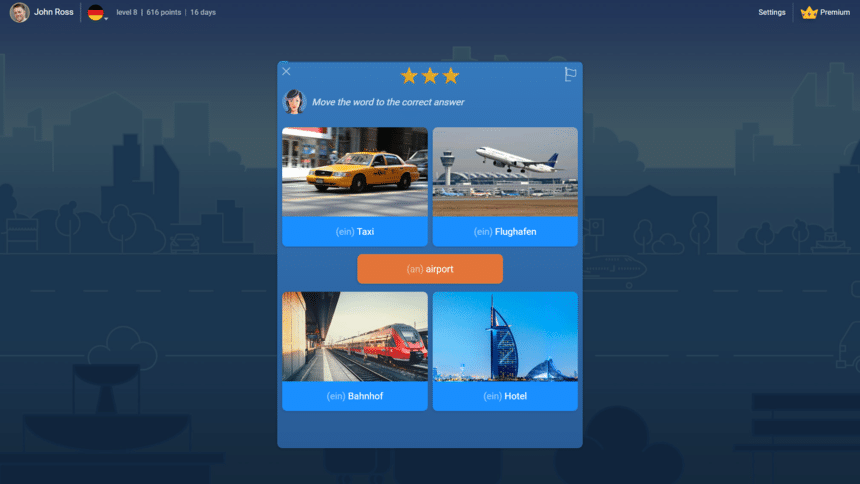
In other words, there is no real order to the pins, and these lessons don’t necessarily build on one another in terms of difficulty. It is much more about what you learn within each pin.
And to reiterate, the pins are supplemental lessons. They are basically the same as the daily lessons in terms of length, format, and content, but they are optional and self-driven.
That’s my recap of the core Mondly program. You complete your five-minute daily lesson, get your review and performance recap, and then you’re free to do other lessons in the geolocation pins on the map based on topic.
Rocket Languages
Now let’s talk about Rocket Languages. In short, the Rocket Languages program is very different from Mondly.
The entire Rocket program is built on audio lessons. To start each unit, you listen to an audio exercise, which is about 30 minutes long.
In this audio exercise, an English-speaking moderator will guide you through a conversation in the language you’re learning step-by-step. You listen to a sentence or two (or sometimes even just a phrase), and then the moderator will pause to explain the situation and have you engage in the conversation by answering questions and repeating phrases.
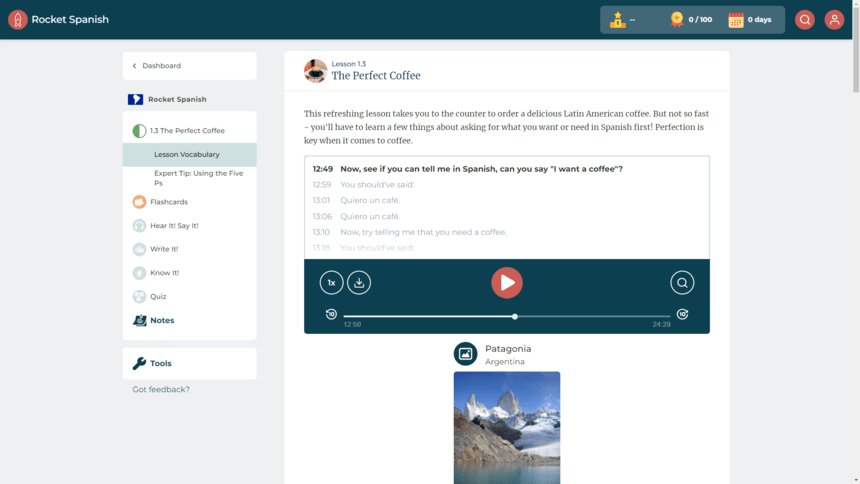
While you listen to the audio exercise, a rolling transcript plays underneath the control panel where you can follow along and see how words are spelled. That is an important aspect for visual learners.
After the audio lesson, you review and reinforce what you just learned through a variety of drills and exercises. These reinforcement drills include listen and repeat-type drills, flashcards, quizzes, and an exercise where you reenact the underlying conversation from the audio lesson by playing the part of the one of the two speakers.
However, the audio lesson and follow-on drills are just the main portion of the Rocket program. The other portion of each learning module is a Language & Culture lesson.
In these lessons, Rocket gives in-depth explanations about specific grammar rules touched on in the audio lesson. These blurbs break down the relevant grammar you need to learn with short explanations, examples, and some visuals.
The main point of these shorter grammar lessons is to explain the structural differences between English and the language you’re learning. Plus, Rocket also hits on some important cultural points as well in these lessons.
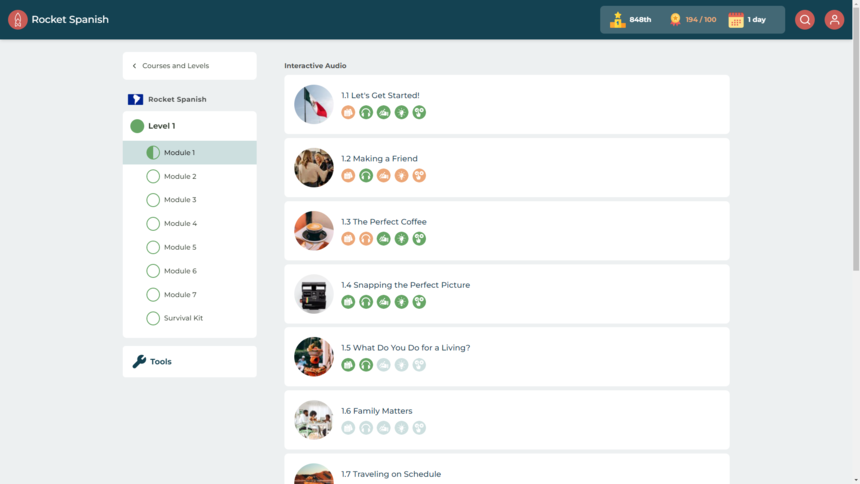
That’s Rocket Languages in a nutshell. There are audio lessons backstopped by reinforcement drills, and some detailed grammar lessons.
Generally speaking, that is how these two apps compare. The big takeaway is that Mondly and Rocket Languages are very different in their approach.
Rocket places a serious focus on learning via detailed audio lessons, and generally speaking has longer overall lessons, while the Mondly lessons are much shorter and rapid fire with a series of hands-on drills.
Cost Comparison
Before we get into the pros and cons of each program, let’s quickly talk about pricing and cost.
Mondly has three different packages to choose from:
- a monthly pay-as-you-go package that costs $10 per month;
- a 12-month subscription that costs $48 in advance for the year (i.e., $4 per month); and
- a lifetime access package that costs around $100 or so with a coupon code or discount link.
Rocket Languages does things differently. They don’t do the subscription model. Rocket Languages only offers one-time purchase, lifetime plans. You buy the course and own it forever.
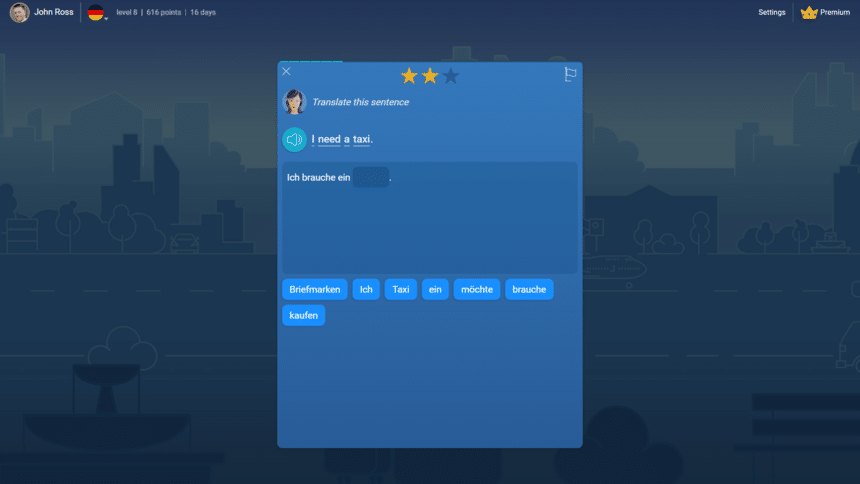
These lifetime Rocket packages range from $150 to $450, depending on how many levels you want to purchase. That said, I would just note that Rocket is really aggressive with running sales and discounts, and you can usually knock 50% or more off the price.
Thus, in terms of cost, it’s kind of hard to compare the two apps as Rocket doesn’t have monthly subscription options. In looking at just the lifetime plans, however, Mondly is a little bit cheaper if you can find one of their standard sales.
Reasons To Choose Rocket Languages
Now that we’ve covered pricing and how each program works, let’s get into what I like and don’t like about each of these apps. Let’s start with Rocket Languages.
Detailed Audio Lessons
Rocket Languages’ greatest advantage is their audio lessons. As noted, these audio lessons are the backbone of this program, and it’s what differentiates Rocket from Mondly (and most other language apps for that matter).
These audio lessons offer a ton of value. They’re engaging, detailed, and do a great job of getting you to think under pressure and verbalize what you’re learning, much like how you will be expected to in the real world.
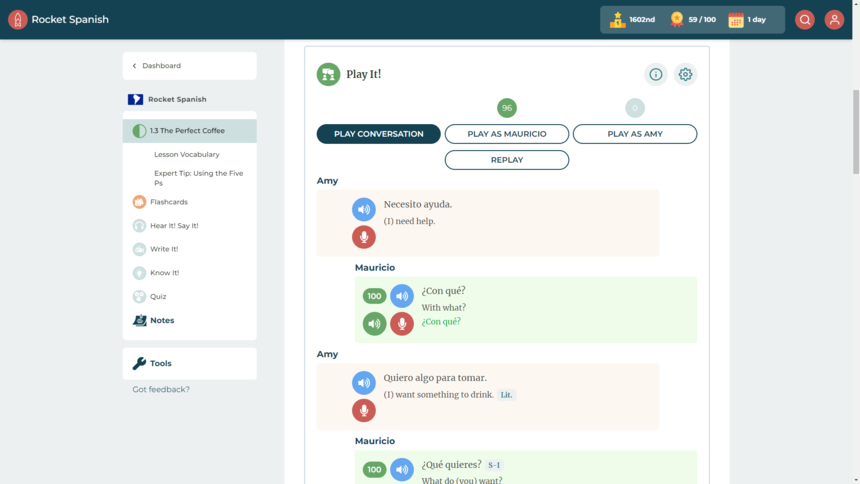
One issue with Mondly is that they don’t have any significant listening or speaking exercises like Rocket’s audio lessons. Yet to me, this verbalization and listening practice is about the most effective way of internalizing a new language and becoming comfortable with it.
One of the coolest parts of the Rocket audio lessons is that when you’re done, you can then roll the underlying conversation from the lesson without interruption and play the part of one of the two speakers. That is a really useful feature in my opinion.
Grammar Instruction
The next great strength of this course is grammar. When it comes to grammar, Mondly doesn’t really give it much coverage.
Rather than giving you direct grammar instruction, Mondly kind of lets you figure out grammar more intuitively by working through the interactive drills. That’s fine, and there is merit to learning more organically in this way, but I much prefer Rocket’s setup.
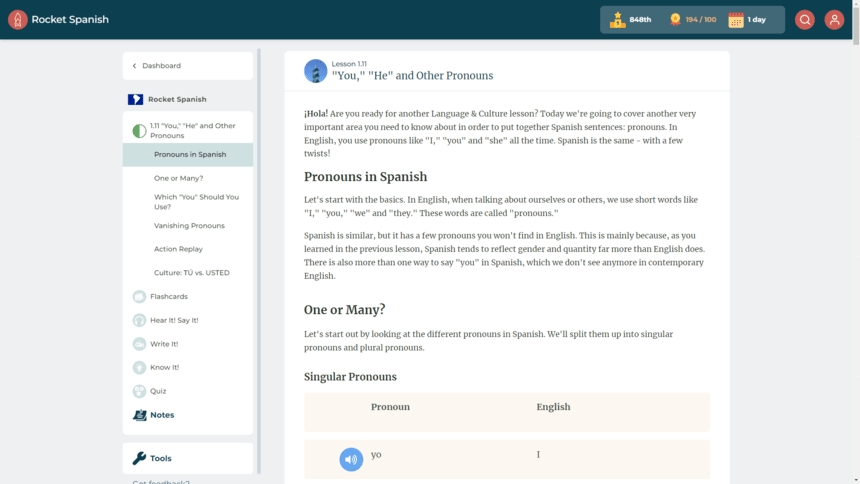
Rocket Languages takes a more direct approach through their Language & Culture lessons in each unit. In these lessons, Rocket dives deep into a specific grammar principle through short explanations, examples, and graphics.
To me, these grammar lessons are really helpful for better understanding structural differences in the languages, and I like Rocket’s straightforward approach.
Learning Framework
Finally, the last advantage for Rocket is the comprehensiveness of the program.
When you’re in each program doing lessons each day, it’s just clear that the Rocket framework is more robust and goes deeper. There are detailed audio lessons, a nice variety of post-audio drills (like flashcards and quizzes), those Language & Culture lessons, and bonus tools, such as language survival kits and leaderboards.
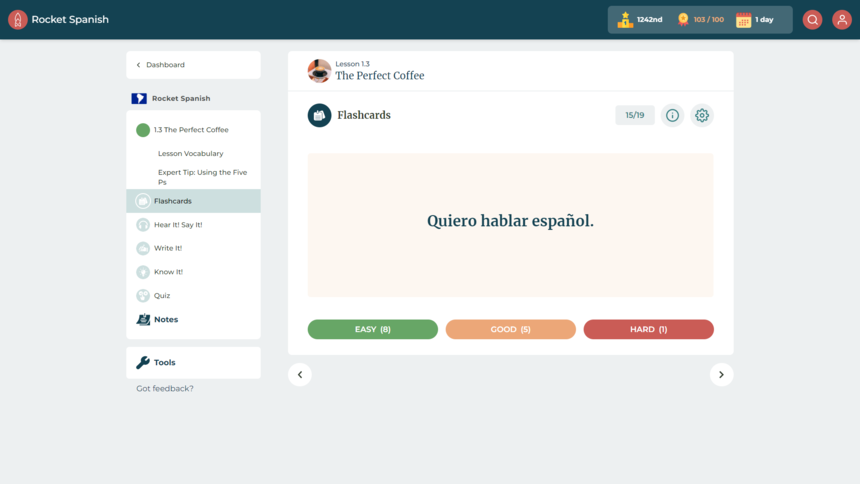
I don’t mean to throw shade on Mondly here, as I do like their program, but it’s just sort of fundamentally different. The Rocket program is simply deeper and more immersive.
The Rocket Languages program feels more like a full academic language course, while Mondly is more like a fun learning tool, if that makes sense.
👉 Read our full review of Rocket Spanish here
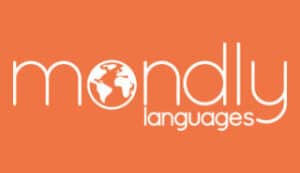
Mondly
- 40+ Languages
- Multiple Subscription Options
Pros
- Quick, engaging lesson format (lessons take just 10 minutes or so)
- Affordable subscription options (as low as $4/mo)
- Great tool for expanding your vocabulary
- Fun AR and VR apps available
Cons
- Curriculum is somewhat basic (not as advanced as Rocket’s)
- Limited grammar instruction
- Lessons could use more speaking and conversational practice
Reasons To Choose Mondly
Having covered the strengths of the Rocket Languages app above, let’s next discuss Mondly’s advantages.
Lesson Format
One of the things that jumped out to me about Mondly’s program is the setup of their lessons. Simply put, they are fun, fast-moving, and very engaging (similar to Duolingo).
Lessons take only five minutes and they just fly by. This can be a good thing or bad thing depending on what you’re looking for in your program, but for a lot of people, these short, bite-sized lessons are perfect.
Plus, the exercise variety within lessons is really nice. Some language apps use boring and repetitive drill types that get old (see Rosetta Stone), but Mondly uses a really nice mix of drills that keeps things balanced and engaging.
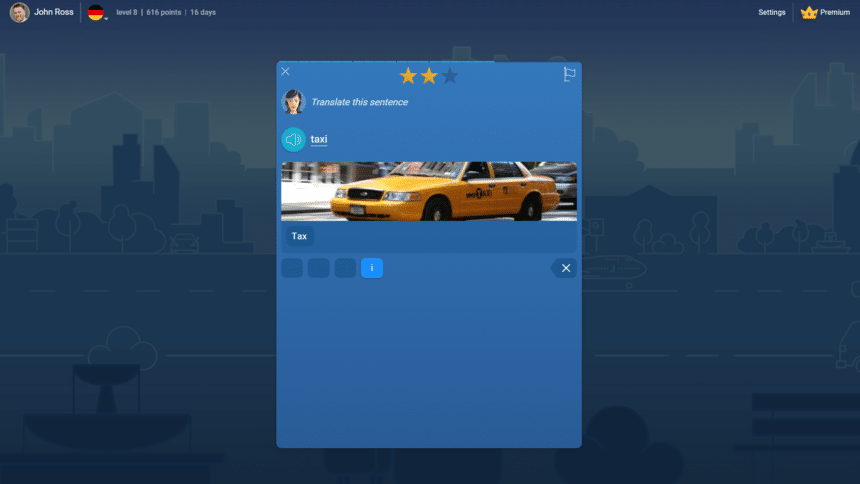
As noted above, there are flashcard drills, fill-in-the-blanks, speaking exercises, translation prompts, matching pairs, back-and-forth dialogues, spelling drills, and a few more.
It’s a great blend of hands-on drill types to engage with. So bottom line, I appreciate how fast moving and interactive Mondly’s lessons are.
Review Sessions
Another big highlight of the Mondly program is their review function. This shows up in two distinct ways.
For one, there’s a quick recap at the end of every lesson. Then, for two, there’s a standalone review tool that deserves some praise. These are two things Rocket doesn’t really have. Let me explain.
On the first point, when you complete one of Mondly’s five-minute lessons, they will quickly run you through a review session where they recap each word or phrase you learned in that unit.
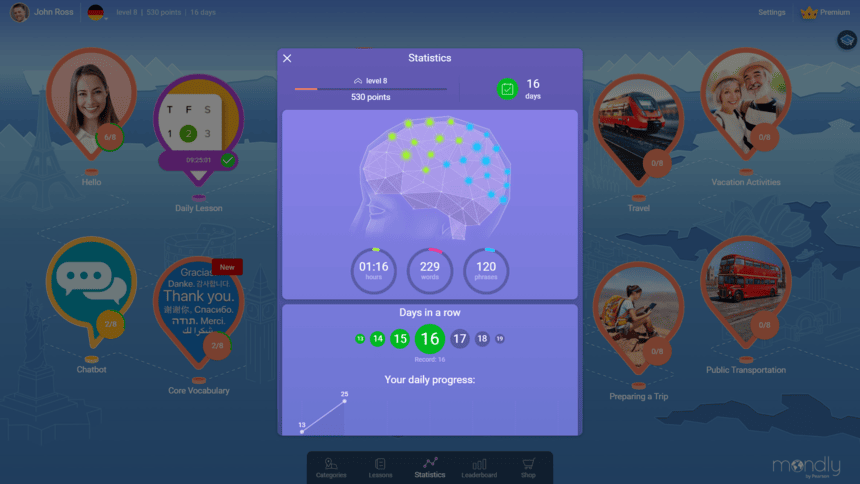
There are typically around 10 to 15 new, key phrases, and Mondly will sprint through them in perhaps 20 or 30 seconds. This is a very good way to drive home what you learned.
Then the other function is a cool brain feature where you can go back and review related vocab and phrases whenever you want. There are little clusters of related phrases that are grouped together on this brain to make reviewing easier, and I really liked that.
It’s not my absolute favorite review tool among apps in the language learning space, but it is useful and Rocket doesn’t have a similar feature.
Verdict: Mondly or Rocket Languages?
Between these two language learning companies, unless you need the shorter, more bite-sized lessons from Mondly, I would go with Rocket Languages. They are definitely one of my favorite language programs on the market, and I don’t think it’s very close when comparing the scope or detail of the two programs side-by side. Rocket’s program is much more in-depth and well-rounded with their audio lessons, detailed grammar lessons, and reinforcement drills.
However, because of this difference in program structure, I actually think these two apps would complement each other nicely. If you wanted to use Rocket as your mainstay learning program and complete a couple full-length lessons per week with them, and then fill in the gaps with Mondly day-to-day, that could be a powerful combo. At the end of the day though, if I had to pick just one, I would go with Rocket Languages.
Lesson format is the biggest difference between Mondly and Rocket Languages. The lessons from Rocket Languages are longer, more comprehensive, and focus on audio exercises, while the lessons from Mondly are shorter and include a more diverse set of practice drills.
After using and thoroughly testing each program, our team believes that Rocket Languages offers the more well-rounded and effective languages courses from top to bottom. The interactive audio lessons from Rocket Languages are particularly helpful for improving your listening and verbal skills.
Yes, Mondly offers both monthly and lifetime subscription options (starting as low as $4 per month), whereas Rocket Languages only offers lifetime plans.

